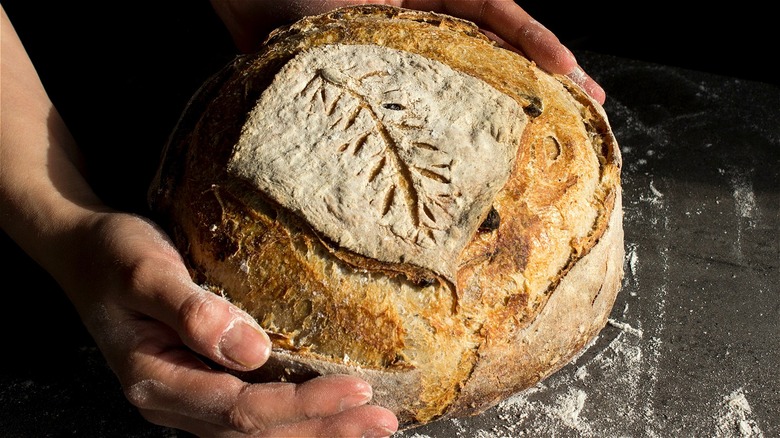Is Sourdough Bread Better For You Than Other Bread Varieties?
Bread has been a popular food staple across many cultures for thousands of years but is there one variety that trumps the rest? According to the USDA's most recent dietary guidelines, the average American is recommended to intake roughly three to five servings of whole grains per day. So then it should come as no surprise that whole wheat and multigrain were the most consumed bread types in the U.S. in 2020 (per Statistica).
However, one kind of bread that has dominated the industry in recent years is sourdough, and this particular type of bread has been around longer than any other and may pose some additional health benefits. According to MasterClass, sourdough bread naturally rises without commercial yeast and is made, alternatively, with naturally occurring wild yeast which can be made at home with equal parts water and flour. NPR suggests sourdough has been used since the evolution of ancient Eygpt and passed down through cultures before commercial yeast began its culmination in breweries in the 1700s (per Explore Yeast).
According to a report by Grandview Research, sourdough bread is on the rise due to consumer demand for healthier and more natural bread products. Before you try making your own no-knead sourdough bread, you may be interested to know this popular variety's health benefits and whether or not it's deemed healthier by professionals than homemade whole-grain or store-bought bread.
Is sourdough the healthiest bread?
While whole grain bread has many health properties and essential vitamins, consuming sourdough bread could be the answer to your gluten intolerance and even purports a lower glycemic index. According to Consumer Reports, the microbes that occur in naturally activated wild yeast break down the gluten content in bread. Registered dietician Kate Scarlata claims those who suffer from digestive issues or chronic conditions such as irritable bowel syndrome also have success consuming sourdough since the use of a wild yeast culture reduces bread's overall fructan content (per Consumer Reports). The Washington Post highlights how many Americans who claim they are gluten intolerant are, in reality, suffering from the inability to digest fructans, which are carbohydrates composed primarily of fructose.
Sourdough's ability to break down these fructans makes the variety easier on the stomach but that's not all sourdough can do; sourdough culture has also been found to break down phytic acid in its production of lactic acid, according to one 2001 study. Furthermore, Healthline states that phytate (phytic acid) is present in many flours and acts as an anti-nutrient since it attaches itself to minerals which makes them harder for the human body to digest.
Serious allergy-related conditions aside, if you have a sensitive stomach when consuming standard bread, you may find sourdough easier on your stomach. But does store-bought sourdough offer the same health benefits as homemade?
Commercial sourdough may not be the real deal
Sourdough is one of many gut-health foods to add to your diet, but taking a shortcut and buying it pre-made in-store may be lacking the health properties often associated with true sourdough. In 2018, UK-based Which? News. found that most commercialized sourdough bread contained not only ready-made yeast but ascorbic acid and vinegar to provide that sourdough flavor and increase the speed of rising. According to Robert Hutkins, Ph.D. and professor at the University of Nebraska-Lincoln, "this doesn't impart the benefits that sourdough made the slow-leavened way does because the microbes don't have time to work their magic," (per Consumer Reports).
Nutritionist Stephanie Kay advises consumers to read labels and look for bread that only contains sourdough's essential ingredients which are flour, water, and salt. Avoid products with commercial yeast or those with a long shelf-life since real food tends to expire faster. If you want true sourdough, less is more when it comes to ingredients, or try your hand at making your own. While one 2014 study proves sourdough enhances the overall qualities of leavened bread ingredients, dietician Steph Grasso emphasized the importance of carbohydrates to CNN, advising consumers that when it comes to bread, people should choose the variety they like best.


